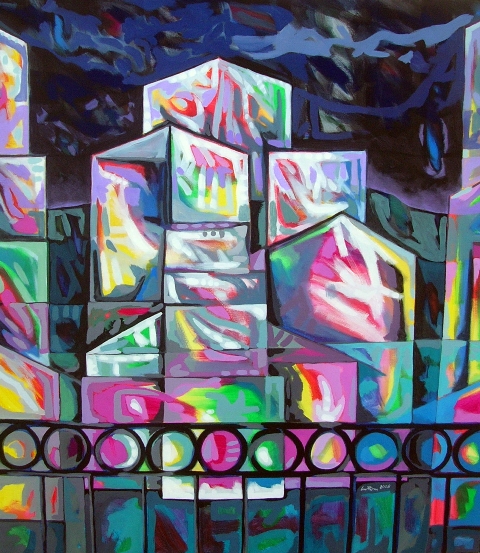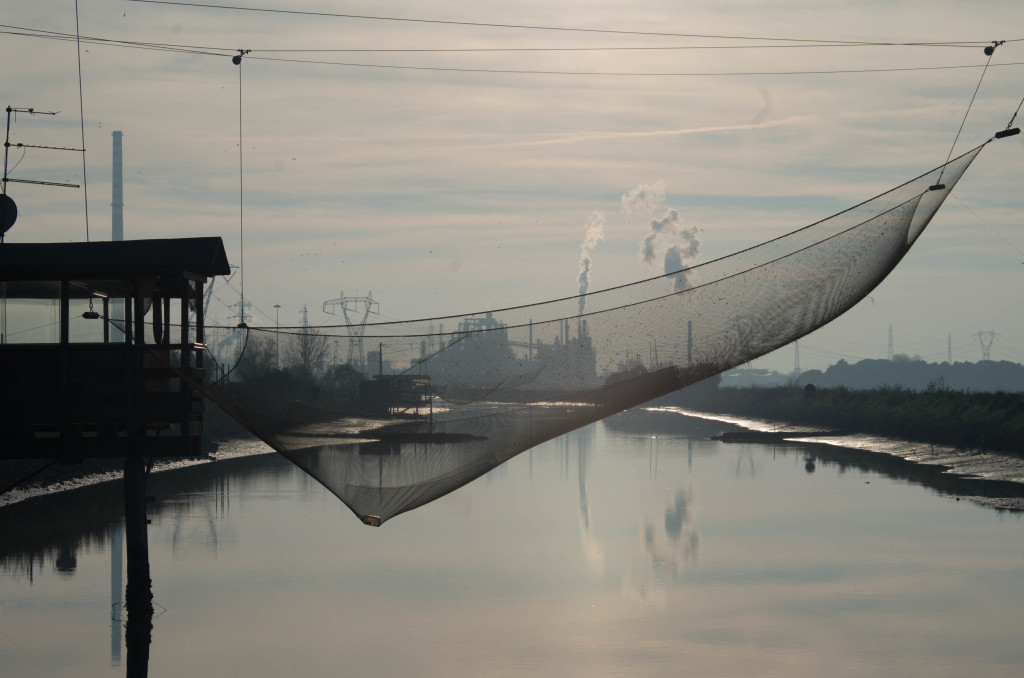[…] The hallway was quiet and deserted. Enzo climbed down the stairs on his tiptoes. He walked past the reception desk and opened the main door to the street. The night porter didn’t take notice of him, nor did he pay attention to the noise he made. Enzo lowered his hood over his head and walked in the direction of the Messina harbor, the piers where the ferries to Calabria were docked. With his hands in his pockets, he crossed via Maddalena and walked at a fast clip through all the streets, taking care not to look at the few cars zipping by in the early morning. In via Vettovaglie, a sleepy prostitute who had just gotten out of a car tried to throw a seductive glance his way. Enzo looked at her and walked past. It was a thankless hour even for those who had to sell their bodies for a piece of bread.
Enzo jumped over several puddles and finally got to the ferry.
The huge belly of the Rosalia was taking aboard the last car of the Palermo-Milan direct train.
Having sailed past the statue of Madonna della lettera, the ferry maneuvered as usual to bring its prow to the front ready to enter the Villa San Giovanni harbor, on the Calabria side of the straights.
The breeze made Enzo close his eyes and he thought about Giulia- warm, beautiful, sensual and scared to death. He thought about the room in which their bodies had turned weightless as they merged.
The journey proceeded faster than expected. Even Andrea was punctual. The two greeted each other and took off in all haste. They exchanged few words about news concerning Nicola and the situation at Grimaldo del Sarro. Three hours later, Enzo was already with his brother. As usual Nicola asked him about Giulia and about his studies and then gave Andrea final instructions, asking him also to replace his brother’s parka, the student protestor uniform those days, with an old jacket. Then they separated.
The two brothers set off to a destination that only Nicola knew. As they came down the mountain, Enzo realized that the olive orchard they were walking through was the Pardeo orchard, the one where his father had been killed. They heard some loud male and female voices, so they hid.
That was the lower production year in the two-year cycle for olive crops, so the local farmers came just to pick kindle and wild greens. Once they got to the family’s out building with the winemaking equipment, Nicola handed Enzo his semi-automatic rifle and opened the door with the key he always had with him. Large oak barrels reminded them of the past when their father produced wine, before a change in government policy discouraged wine production and the vineyards were taken out. Nicola pulled out from the barrel a perfectly stored double-barreled, 12 gauge rifle and handed it to his brother together with 8 buckshot pellets. They left immediately and started walking towards their hideout.
Only then did Nicola realize that he didn’t have a ski mask for his brother, so as they walked through olive and fruit groves Nicola noticed a house he knew to belong to a farmer. He kicked the door in and entered. Hanging from a nail he noticed some work clothes, including a woolen sweater that was suitable for what they needed to do.
He used a knife to cut off one of the sleeves and then tied one end with some twine, proceeded to stretch the opposite end with his hands, slipped it over his brother’s head, and then tore some holes where his eyes and mouth were supposed to be. […]

Santo Gioffrè is a physician, historian and novelist born and living in Calabria. His writing has concentrated on a new narration of the history of his birthplace (Seminara), a retelling of the stories of notable figures such as Barlaam, Leonzio Pilato, Artemisia Sanchez who were born there, situating them in a choral narration of little known historical and social circumstances. His novel Artemisia Sanchez (2008) was used as the basis for a highly acclaimed TV series in Italy. His latest effort L’opera degli ulivi touches on the intersection of the youth revolt movements of the 70’s, their complicated ‘coexistence’, at the university of Messina, with conservative, entrenched institutions, their resistance against and forced interaction with national and international neo-fascist movements and organized crime. The novel follows closely the dynamic and relations within a Calabrian family whose members end up reluctantly recruited in the ndrangheta at a time when the organization is crossing over from being a rural based criminal organization into broader business ventures, tied with national and international politics, the drug trade and government contracts.
This issue of The Dreaming Machine has excerpts from the work of another Calabrian novelist, Gioacchino Criaco, who explores the resistance movement in the 1970’s of jasmine pickers in a small Calabrian village
Featured image: painting by Giacomo Cuttone http://www.cuttone.altervista.org/gall/completa.html.





















































